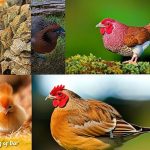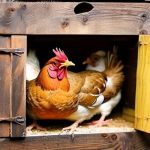Gateshead Council has recently approved a policy allowing residents to keep chickens in urban areas. This decision is part of the council’s initiative to promote sustainability and self-sufficiency within the community. The council aims to encourage a closer connection to food production and reduce the environmental impact of food transportation by permitting residents to keep chickens.
This policy aligns with the growing trend of urban farming and the increasing demand for fresh, locally sourced produce. The council believes that keeping chickens can offer numerous benefits to the community and is committed to implementing and maintaining this program responsibly and sustainably. The decision to allow urban chicken-keeping has been positively received by many community members.
Residents view this as an opportunity to connect with nature, educate their children about food production, and enjoy the benefits of fresh eggs. Additionally, keeping chickens can help residents reduce their environmental footprint and contribute to a more sustainable lifestyle. The council’s decision reflects a growing interest in urban agriculture and a desire for more self-sufficient and resilient communities.
By permitting residents to keep chickens, Gateshead Council is taking a proactive step towards promoting sustainability and empowering residents to have greater control over their food sources.
Table of Contents
- 1 Benefits of keeping chickens in urban areas
- 2 How Gateshead Council plans to implement and maintain the chicken program
- 3 Community involvement and education about keeping chickens
- 4 Potential challenges and solutions for keeping chickens in an urban setting
- 5 Impact on local economy and sustainability
- 6 Future plans for expanding the chicken program in Gateshead
- 7 FAQs
- 7.1 What are the regulations for keeping chickens in Gateshead?
- 7.2 How many chickens are residents allowed to keep in Gateshead?
- 7.3 What are the guidelines for the coop and run for chickens in Gateshead?
- 7.4 Are there any restrictions on keeping chickens in certain areas of Gateshead?
- 7.5 What should residents do with chicken waste in Gateshead?
Key Takeaways
- Gateshead Council has decided to allow residents to keep chickens in urban areas to promote sustainability and community involvement.
- Keeping chickens in urban areas can provide benefits such as fresh eggs, natural pest control, and educational opportunities for children.
- The Council plans to implement the chicken program by providing guidelines for coop construction, offering workshops on chicken care, and monitoring the program to ensure compliance with regulations.
- Community involvement and education about keeping chickens will be promoted through workshops, school programs, and community events to raise awareness and provide support for new chicken owners.
- Potential challenges for keeping chickens in urban settings include noise, waste management, and potential conflicts with neighbors, which can be addressed through proper coop design, waste management strategies, and community communication.
Benefits of keeping chickens in urban areas
Fresh Eggs and Cost Savings
Keeping chickens can provide a sustainable source of fresh eggs for residents, leading to cost savings and reducing the reliance on store-bought eggs. This is particularly important as many store-bought eggs come from industrial farming operations with questionable animal welfare practices.
Connection to Nature and Food Production
Caring for chickens can provide a sense of connection to nature and the food production process, which is increasingly important in an urbanized society. This connection can have a positive impact on individuals and the community, promoting a greater appreciation for where our food comes from.
Environmental Benefits
Keeping chickens can also have environmental benefits. Chickens are natural composters and can help reduce food waste by consuming kitchen scraps and producing valuable fertilizer for gardens. This contributes to a more circular and sustainable food system within urban areas. Additionally, by keeping chickens, residents can reduce their carbon footprint by sourcing their eggs locally, rather than relying on eggs that have been transported long distances.
How Gateshead Council plans to implement and maintain the chicken program

Gateshead Council has developed a comprehensive plan for implementing and maintaining the chicken program in urban areas. The council will provide guidelines and regulations for residents who wish to keep chickens, ensuring that the program is implemented in a responsible and sustainable manner. This includes regulations on coop size, noise control, and waste management to minimize any potential negative impacts on the community.
The council also plans to provide resources and support for residents who are interested in keeping chickens. This may include workshops on chicken care, coop building, and best practices for sustainable chicken keeping. Additionally, the council will work with local suppliers to ensure that residents have access to high-quality feed, bedding, and other necessary supplies for keeping chickens.
In terms of maintenance, the council will regularly monitor the chicken program to ensure that it is being carried out in accordance with regulations. This may involve periodic inspections of chicken coops and addressing any concerns or complaints from the community. The council is committed to maintaining a high standard for the chicken program to ensure that it remains a positive addition to urban life in Gateshead.
Community involvement and education about keeping chickens
Community involvement and education about keeping chickens will be key components of Gateshead Council’s chicken program. The council plans to engage with residents through workshops, events, and educational materials to promote responsible chicken keeping practices. This may include information on proper coop design, nutrition, health care, and behavior management for chickens.
In addition to educational resources, the council will also encourage community involvement through events such as coop tours, chicken care demonstrations, and networking opportunities for chicken keepers. This will provide an opportunity for residents to share their experiences, learn from one another, and build a sense of community around the chicken program. Furthermore, the council plans to work with local schools and community organizations to incorporate chicken keeping into educational programs.
This may involve creating opportunities for students to learn about food production, animal care, and sustainability through hands-on experiences with chickens. By involving the community in education about chicken keeping, Gateshead Council hopes to foster a greater understanding and appreciation for sustainable living practices.
Potential challenges and solutions for keeping chickens in an urban setting
While there are many benefits to keeping chickens in urban areas, there are also potential challenges that need to be addressed. One challenge is noise control, as roosters can be loud and disruptive in an urban environment. To address this issue, Gateshead Council may consider implementing regulations that prohibit the keeping of roosters within city limits or require soundproofing measures for chicken coops.
Another potential challenge is waste management, as chicken manure can be odorous and attract pests if not properly managed. To mitigate this issue, the council may provide guidance on composting chicken manure or offer resources for residents to properly dispose of waste. Additionally, regular coop inspections can help ensure that waste management practices are being followed.
Furthermore, there may be concerns about potential health risks associated with keeping chickens in urban areas. To address this, the council can provide information on best practices for disease prevention and biosecurity measures for chicken coops. By addressing these potential challenges proactively, Gateshead Council can ensure that the chicken program is implemented in a way that minimizes negative impacts on the community.
Impact on local economy and sustainability

Boosting Economic Activity
By allowing residents to keep chickens, there is potential for increased economic activity through the sale of surplus eggs or other chicken-related products. This can contribute to a more diverse and resilient local economy by providing opportunities for small-scale entrepreneurship within the community.
Promoting Sustainability
Furthermore, the chicken program aligns with sustainability goals by promoting local food production and reducing the environmental impact of food transportation. By sourcing eggs locally, residents can reduce their carbon footprint and support a more sustainable food system. Additionally, the act of composting chicken manure can contribute to healthier soil and more productive urban gardens, furthering sustainability efforts within the community.
Building a Resilient Community
Overall, the implementation of the chicken program has the potential to strengthen the local economy and promote sustainability within Gateshead. By empowering residents to take control of their food sources and engage in small-scale agriculture, the council is taking steps towards building a more resilient and self-sufficient community.
Future plans for expanding the chicken program in Gateshead
Looking ahead, Gateshead Council has ambitious plans for expanding the chicken program within the community. The council aims to continue promoting awareness and education about responsible chicken keeping practices through workshops, events, and outreach efforts. This will help ensure that residents have access to the resources they need to successfully keep chickens in urban areas.
Additionally, the council plans to explore opportunities for integrating chicken keeping into other sustainability initiatives within Gateshead. This may include partnerships with local businesses or organizations to promote sustainable food production practices or incorporating chicken keeping into broader urban agriculture programs. Furthermore, there is potential for the chicken program to serve as a model for other urban areas looking to promote sustainability and self-sufficiency within their communities.
By sharing their experiences and best practices with other municipalities, Gateshead Council can help inspire similar initiatives in other cities. In conclusion, Gateshead Council’s decision to allow residents to keep chickens in urban areas reflects a commitment to promoting sustainability, self-sufficiency, and community engagement. By implementing and maintaining this program in a responsible manner, the council aims to provide numerous benefits to residents while minimizing potential challenges.
Through community involvement and education efforts, Gateshead Council hopes to foster a greater understanding and appreciation for sustainable living practices. The impact of the chicken program on the local economy and sustainability efforts is expected to be positive, with potential for future expansion and collaboration with other municipalities.
If you’re interested in learning more about keeping chickens, you might want to check out this article on chicken coop interior ideas. It offers some great tips and inspiration for creating a comfortable and functional living space for your feathered friends.
FAQs
What are the regulations for keeping chickens in Gateshead?
In Gateshead, residents are allowed to keep chickens in their gardens as long as they adhere to certain regulations. These regulations include limits on the number of chickens allowed, the distance of the coop from neighboring properties, and the proper disposal of waste.
How many chickens are residents allowed to keep in Gateshead?
Residents in Gateshead are typically allowed to keep up to 6 chickens in their garden without the need for planning permission. However, it is important to check with Gateshead Council for any specific regulations or restrictions in your area.
What are the guidelines for the coop and run for chickens in Gateshead?
The coop and run for chickens in Gateshead must be of a suitable size and design to ensure the welfare of the chickens. It should also be positioned a certain distance from neighboring properties to minimize any potential nuisance.
Are there any restrictions on keeping chickens in certain areas of Gateshead?
Some areas within Gateshead may have specific restrictions or regulations regarding the keeping of chickens. It is important for residents to check with Gateshead Council or their local authority to ensure compliance with any local bylaws or regulations.
What should residents do with chicken waste in Gateshead?
Residents in Gateshead are required to properly dispose of chicken waste to prevent any nuisance or health hazards. This may include composting the waste or using it as fertilizer in a responsible manner.
Meet Walter, the feathered-friend fanatic of Florida! Nestled in the sunshine state, Walter struts through life with his feathered companions, clucking his way to happiness. With a coop that’s fancier than a five-star hotel, he’s the Don Juan of the chicken world. When he’s not teaching his hens to do the cha-cha, you’ll find him in a heated debate with his prized rooster, Sir Clucks-a-Lot. Walter’s poultry passion is no yolk; he’s the sunny-side-up guy you never knew you needed in your flock of friends!







